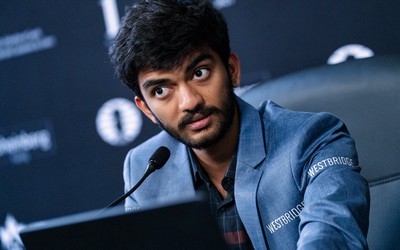
FIDE Candidates 2024: Preview and Predictions
Sixteen players, two potential world championsIn just 24 hours, the 2024 Candidates and Women’s Candidates start in Toronto!
There was some drama to get here, but with all visas approved in time, both Candidates will shortly be taking place in Toronto – the first Candidates Tournament played in North America since 2007.
This cosmopolitan high-rise city, famed for its diversity, will be the first in history to host the Open Candidates and Women’s Candidates simultaneously. Thus, for the first time, we will know the Challengers for the respective World Championship titles on the same day.
Both sections promise 14 rounds of exciting elite-level chess, undoubtedly with their fair share of upsets, surprises, and twists. And now, for the first time in Lichess history, you will be able to watch it with us. Each round will be streamed by Lichess on YouTube and Twitch, hosted by IM Irene Sukandar with co-hosts GM Matthew Sadler, IM Eric Rosen, IM Laura Unuk, and many other guests.
Meet the Candidates
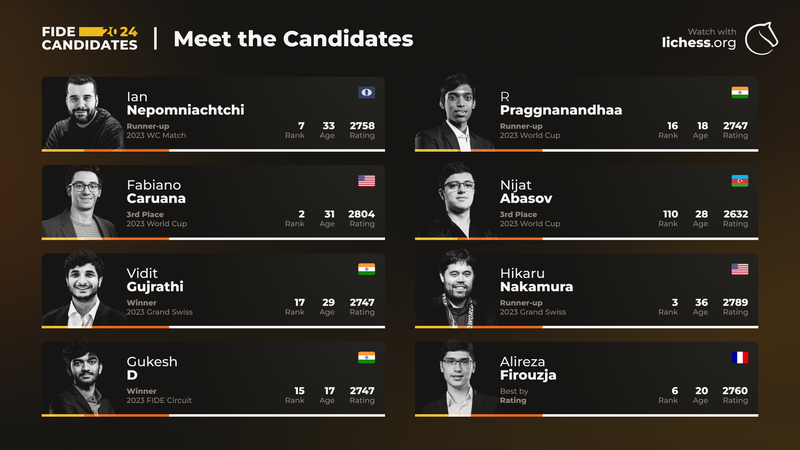
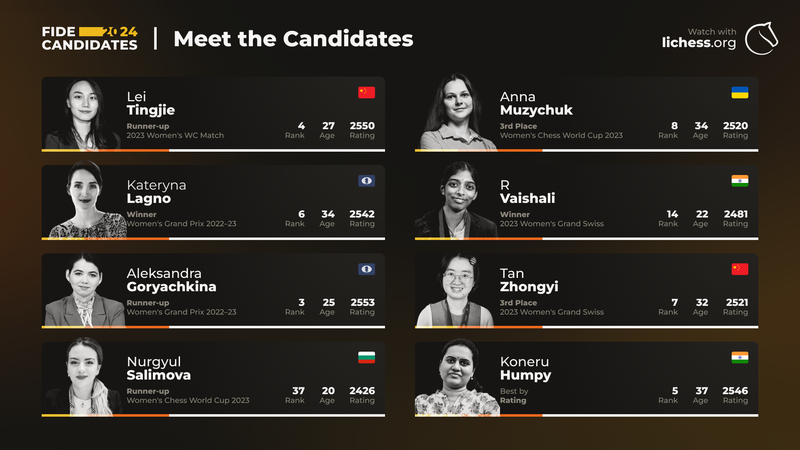
Tournament Schedule and Prizes
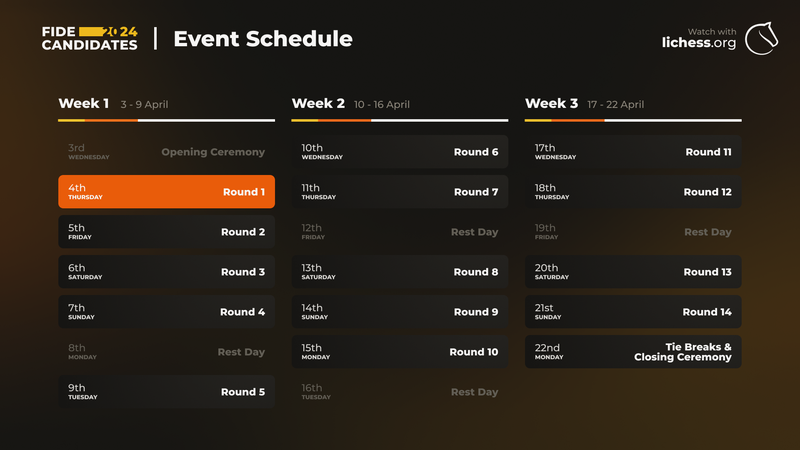
The prize fund for the Open section is €500,000, while that of the Women's section is €250,000.
Predictions: Open
Starting with the Open and then going on to the Women’s, let’s look at this in two ways – first what the raw numbers say, and then a more holistic assessment.
Looking purely at ratings, the expected places and scores are:
Fabiano Caruana on 8.3 / 14
Hikaru Nakamura on 8.0 / 14
Alireza Firouzja on 7.3 / 14
Ian Nepomniachtchi on 7.3 / 14
R Praggnanandhaa on 7.0 / 14
Gukesh D on 7.0 / 14
Vidit Gujrathi on 6.6 / 14
Nijat Abasov on 4.6 / 14
Obviously, this isn’t perfect because it’s impossible for a player to get anything beyond 1, 0.5, or 0 for a win, draw or loss. However, it generally shows that the ratings suggest we have two clear favourites, followed by a relatively packed mid-table with little differentiation.
To try and refine this, we ran 1 million simulations and received the following output (we also accounted for drawing chances, and a 35 Elo White advantage):
| Player | Win probability | Most frequent predicted position | Predicted points average |
|---|---|---|---|
| Fabiano Caruana | 33.7% | 1 | 8.3 |
| Hikaru Nakamura | 24.3% | 1 | 8.0 |
| Alireza Firouzja | 11.5% | 4 | 7.3 |
| Ian Nepomniachtchi | 10.8% | 4 | 7.3 |
| R Praggnanandhaa | 8% | 6 | 7.0 |
| Gukesh D | 7.1% | 6 | 7.0 |
| Vidit Gujrathi | 4.3% | 7 | 6.6 |
| Nijat Abasov | 0.2% | 8 | 4.6 |
But, the Candidates aren’t played a million times — they’re played once. So it only takes a bad run (like Wang Hao’s end to the 2020/21 Candidates), a bit of tilt, some rust, or a hot streak to turn any simulation on its head.
Considering the players more holistically — their activity, their psychology, the form they appear to be in, and their consistency — in our opinion the numbers overestimate some players’ winning chances and underestimate them for others.
Half the field has Candidates experience. This will be Caruana’s fifth Candidates — a historic achievement in and of itself. It will be the third for Nakamura and Nepomniachtchi — who’s never not won the Candidates — and Firouzja’s second. This experience will surely help calm any nerves and jitters, especially for Caruana and Nepomniachtchi, the two previous winners in the field.
The odds may favour these four, but of course numbers don’t tell the whole story.
Firouzja only played three top-tier classical tournaments between October 2022 and January 2024, and each time he had an underpar or average performance. That said, he had some incredible games in January’s Tata Steel Masters, but he also had surprising losses, including against GM Ju Wenjun, rated 200 points below him at the time. His form and motivation are unclear. He’s taken time away from chess to pursue fashion design, but surely he won’t want another disappointing Candidates after scoring 6/14 in 2022, and he retains a positive head-to-head record against Caruana, Vidit, and Nepomniachtchi (correction 4/4: @ack_chess in the forums points out that Firouzja actually has a negative record against Fabi, Vidit and Nepo, and only has a positive H2H against Abasov.)
Speaking of whom, Nepomniachtchi is capable of the most beautiful chess imaginable during his hot streaks, and the most devastating implosions when he’s on tilt. This year, he’s given the impression of a wounded animal, licking his wounds, gathering his strength, biding his time. A lacklustre Superbet Grand Chess Tour last June can surely be put down to fatigue after a physically and emotionally draining World Championship match. The same could be said for a fairly average World Cup run and similar Sinquefield Cup. It’s been a while since a Nepomniachtchi hot streak, but if it can ever happen, it will be in the Candidates — as he’s shown us before. Twice.
Nakamura’s return to over the board chess has been a joy to watch. Narrowly missing out on second place in the 2022 Candidates, he later finished second in the FIDE World Blitz and Airthings Masters — both times behind Magnus Carlsen. He overcame Caruana three times in critical games — during the Chessable Masters, and Norway Chess — both times resulting in first-place finishes, and when he came second in the Grand Swiss. Motivated, more consistent than ever, and playing perhaps some of the best chess of his life, Nakamura is certainly a real threat.
Caruana, however, has always been consistent, motivated, and ruthless across the board. This year has been one of his most sparkling in a career full of dazzling moments. He won the Grand Chess Tour with the most aggregated points in its history, with three 1st place finishes across Grand Chess Tour events; he has also won his third US Chess Championship. He had an excellent World Cup, and a very respectable result in the Grand Swiss. In fact, Caruana might be the best classical chess player in the world at the moment, and if he maintains his form – a good bet given his consistency – it’s difficult to see anyone else winning the Candidates.
Gukesh and Praggnanandhaa are both young prodigies, and incredibly active players who are developing in leaps and bounds. They’ve both been India’s top-rated player at various points over the last few months, although right now that distinction is held by Arjun Erigaisi (another exceptional young talent). It would do them a considerable disservice to write off their chances, and it would not be unreasonable to say that Praggnanandhaa in particular is hard-done by the numbers. He has a certain fearlessness and sangfroid in his approach to chess, which amongst the younger generation is second only to Nodirbek Abdusattorov’s. Praggnanandhaa could realistically do harm to this field, and finish far higher than the lower mid-table the numbers predict. Abasov has likewise been too easily dismissed, with his work ethic and motivation being second to none, and his head to head record generally being equal or favourable to all of the field. Vidit also had an excellent Grand Swiss and has benefitted — along with Praggnanandhaa and Vaishali, competing in the Women’s Candidates — from the Indian government investing $250,000 in Candidates training.
In summary, here’s how we think the standings will shake out:
- Fabiano Caruana
- Ian Nepomniachtchi
- Hikaru Nakamura
- R Praggnanandhaa
- Gukesh D
- Vidit Gujrathi
- Alireza Firouzja
- Nijat Abasov
Predictions: Women
We’re going to be frank: @OnTheQueenside has already produced an excellent preview of the Women’s Candidates. We can’t hope to match it. Take a look for yourselves, and be sure to give them a follow.
Starting purely with the numbers again, on paper this field seems more even than the Open event. Looking only at ratings, the numbers suggest:
Aleksandra Goryachkina on 7.8 / 14
Lei Tingjie on 7.7 / 14
Humpy Koneru on 7.6 / 14
Kateryna Lagno on 7.5 / 14
Tan Zhongyi on 7.1 / 14
Anna Muzychuk on 7.0 / 14
R Vaishali on 6.1 / 14
Nurgyul Salimova on 5.1 / 14
The same proviso as for the Open remains — this clearly isn’t perfect, because it’s impossible for a player to get anything other than a win, draw or loss (1, 0.5 or 0 points). However, it suggests that any player — and especially anyone in the top 5 or 6 — has a statistically reasonable chance of finishing first.
As with the Open, we refined this over 1 million simulations, and received the following output (we also added probability of drawing chances and a 35 Elo White advantage, and shrinkage to account for over/underrating):
| Player | Win probability | Most frequent predicted position | Predicted points average |
|---|---|---|---|
| Aleksandra Goryachkina | 21.7% | 1 | 7.8 |
| Lei Tingjie | 20.3% | 1 | 7.7 |
| Humpy Koneru | 18.4% | 1 | 7.6 |
| Kateryna Lagno | 16.7% | 1 | 7.5 |
| Tan Zhongyi | 9.9% | 5 | 7.1 |
| Anna Muzychuk | 9.6% | 5 | 7.0 |
| R Vaishali | 2.7% | 7 | 6.1 |
| Nurgyul Salimova | 0.7% | 8 | 5.1 |
It’s immediately obvious how much closer this tournament is on paper – with four players who in theory could end up on 8 points (rounding to the nearest integer). The numbers suggest it wouldn’t be surprising if first place gets decided on tiebreaks.
But enough with the numbers. Again, half the field has played in the Candidates before. Goryachkina, Muzychuk, Lagno, and Tan Zhongyi have played every edition of the Candidates. Indeed, Goryachkina and Zhongyi have won it before losing to the Women’s World Champion, Ju Wenjun. Koneru and Tingjie have played in two previous Candidates, with Vaishali and Salimova left as the two rookies. They’re also the youngest players in the field; everyone else is considerably more established. Lagno, for example, has been rated over 2500 for nearly 15 years, and Koneru for nearly 20 years.
However, these four players – Vaishali, Salimova, Lagno and Koneru – are probably the most unpredictable in the tournament. Lagno and Koneru have had long and brilliant careers, but their recent form has been inconsistent. Their odds may be a little kind.
Vaishali in particular could spring a real upset. Sponsored by Ramco, trained in Vishy Anand’s academy (WACA), helped by coaching and second support from her brother, receiving her share of $250,000 from the Indian government to train for this event – and with her rating still climbing – she’s a good bet to finish higher than the seventh place suggested by the numbers. At the same time, in a recent New in Chess interview she admitted to struggling with expectations and pressures, leading to a dip in form. It would certainly be a fairytale finish if she and Pragg both won their respective events.
Similarly, Muzychuk and Zhongyi’s chances may be better than indicated by the stats. Both are experienced and strong players. Zhongyi was Women’s World Champion prior to Ju Wenjun, and while Muzychuk hasn’t quite reached those heights, she has performed well in previous Candidates, finishing second in 2019. However, Muzychuk’s rating has dropped recently. Zhongyi is also a real threat, having recently defeated the two favourites, but her form was inconsistent over 2023 and she may struggle to be consistent enough to conquer the field.
Moving onto the two favourites – Goryachkina was absolutely formidable in 2020, seemingly unable to lose a game. If she were still in that form, she would be the runaway favourite, but her activity and form have decreased in recent years, and she seems to have lost some of the killer instinct that made her so intimidating to play against before. She’s still a big threat though – but maybe not as clear a favourite as the numbers would lead you to believe.
Tingjie has played rarely since the pandemic, and with large gaps between appearances, but her level of play hasn’t been affected. She won her previous Candidates tournament despite not playing for 10 months prior. It’s the same story this time round. As @OnTheQueenside highlights, her first few rounds could easily determine her overall chances; a good start will be crucial.
Predicting final standings is usually a fool’s errand — especially with so many uncertain factors at play — but we’ve been called worse things before (see the forums), so here’s our final predictions (they’re almost identical to those of @OnTheQueenside, except Vaishali and Tan Zhongyi’s places are switched).
- Lei Tingjie
- Aleksandra Goryachkina
- Anna Muzychuk
- R Vaishali
- Tan Zhongyi
- Humpy Koneru
- Kateryna Lagno
- Nurgyul Salimova
Closing Thoughts
As this preview shows, we're in for some exciting weeks of highest-level chess action. Follow it all on our recently overhauled broadcast pages, and be sure to tune in to our streams on YouTube and Twitch. In addition, watch this space for more blogs and annotated games from the two Candidates tournaments.
More blog posts by Lichess
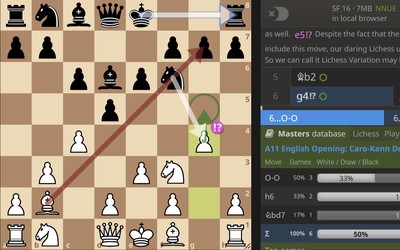
Lichess Game of the Month: March 24
Aggressive English/Reti system with 6.g4!?
Round 14: Gukesh and Zhongyi are officially the World Championship Challengers
A historic finish to the FIDE Candidates, as 17 year old Indian prodigy becomes the youngest World C…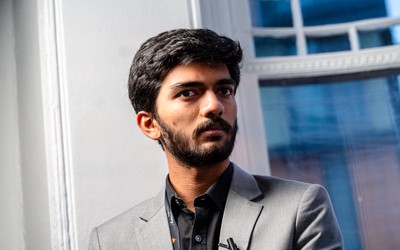
Candidates Round 13: Gukesh takes the lead, Zhongyi pulls ahead
A massive day for the 17 year old Indian, as his chances to win the Candidates skyrockets, as Zhongy…